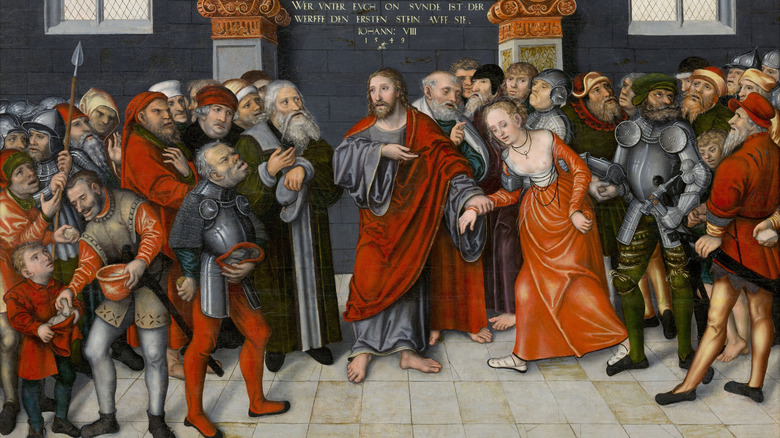What The Bible Really Says About Adultery
Adultery has always been a sensitive topic in relationships. The word derives from the Latin word "adulterāre," which means "to pollute, defile, commit adultery," according to Merriam-Webster. Unsurprisingly, it is a recurring topic in the Bible, appearing 52 times in the Old and New Testaments (via Christian Bible Reference). The first time it appears in the Bible is in the Book of Exodus, when God reveals to Moses the Ten Commandments, where it simply says, "You shall not commit adultery," per Exodus 20:14. However, there is no further explanation about its definition.
Later, adultery is mentioned again in the book of Hebrews. "Let marriage be held in honor among all, and let the marriage bed be undefiled, for God will judge the sexually immoral and adulterous," it says, per Hebrews 13:4.
The Book of Leviticus explains how people involved in adultery should be punished. "If a man commits adultery with the wife of his neighbor, both the adulterer and the adulteress shall surely be put to death," per Leviticus 20:10.
Adultery in the New Testament
Adultery is still considered a sin in the New Testament, and it is mentioned several times. However, Jesus gives new insights about its punishment. When a woman is caught in adultery, people are eager to punish her with death, and Jesus simply says: "Let him who is without sin among you be the first to throw a stone at her," per John 8:3-11. People then went away one by one, and the woman survived.
Jesus also expanded the concept of adultery. "You have heard that it was said, 'You shall not commit adultery.' But I tell you that anyone who looks at a woman lustfully has already committed adultery with her in his heart," he says in Matthew 5:27-28.
Jesus also claims that anyone who divorces their wives should give them a certificate of divorce. "But I tell you that anyone who divorces his wife, except for sexual immorality, makes her the victim of adultery, and anyone who marries a divorced woman commits adultery," he says in Matthew 5:31.

